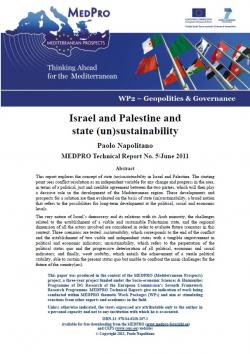Israel and Palestine and State (Un)Sustainability
This report explores the concept of state (un)sustainability in Israel and Palestine. The starting point sees conflict resolution as an independent variable for any change and progress in the area, in terms of a political, just and credible agreement between the two parties, which will then play a decisive role in the development of the Mediterranean region. These developments and prospects for a solution are then evaluated on the basis of state (un)sustainability, a broad notion that refers to the possibilities for long-term development at the political, social and economic levels. The very nature of Israel’s democracy and its relations with its Arab minority, the challenges related to the establishment of a viable and sustainable Palestinian state, and the regional dimension of all the actors involved are considered in order to evaluate future scenarios in this context. Three scenarios are tested: sustainability, which corresponds to the end of the conflict and the establishment of two viable and independent states with a tangible improvement in political and economic indicators; unsustainability, which refers to the perpetration of the political status quo and the progressive deterioration of all political, economic and social indicators; and finally, weak stability, which entails the achievement of a sterile political stability, able to sustain the present status quo but unable to confront the main challenges for the future of the country(ies).
Documento prodotto nell'ambito del progetto MedPro (Mediterranean Prospects), finanziato dal settimo Programma quadro dell'Unione europea. Versione rivista pubblicata in: Silvia Colombo and Nathalie Tocci (eds.), The Challenges of State Sustainability in the Mediterranean, Roma, Nuova Cultura, settembre 2011, p. 193-122 (IAI Research Paper 3).
-
Dati bibliografici
Brussels, MedPro and Centre for European Policy Studies, June 2011, 17 p. (MEDPRO Technical Paper ; 5) -
ISBN/ISSN/DOI:
978-94-6138-107-1
Introduction
1. State sustainability in Palestine: The challenges and the risks of institutional reform
2. The (un)sustainability of the state of Israel
3. Between sustainability and unsustainability: Weak stability
References
Tema
Tag
Contenuti collegati
-
Ricerca06/01/2014
MEDPRO - Prospective analysis for the Mediterranean region
leggi tutto




